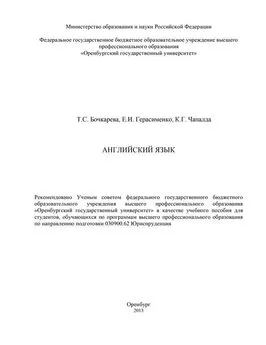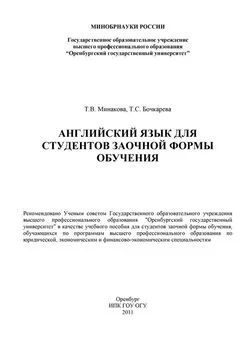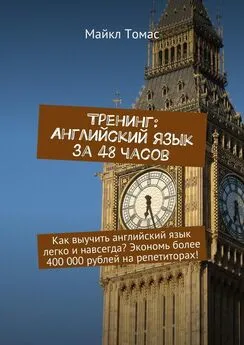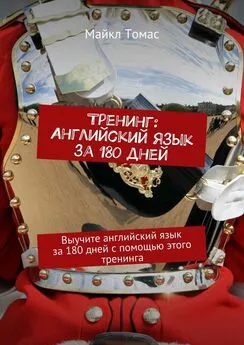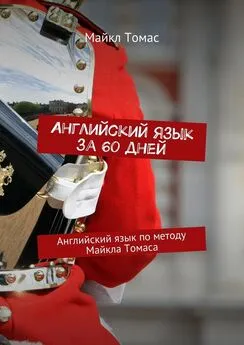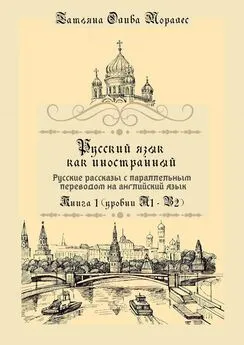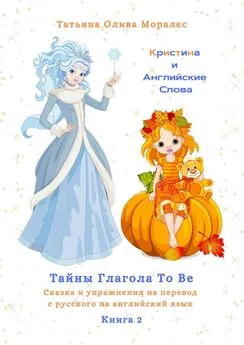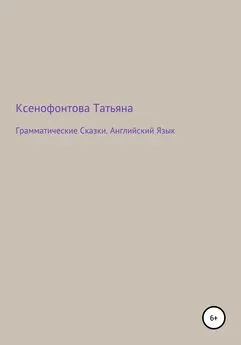Татьяна Бочкарева - Английский язык
- Название:Английский язык
- Автор:
- Жанр:
- Издательство:Литагент БИБКОМ
- Год:2013
- Город:Оренбург
- ISBN:нет данных
- Рейтинг:
- Избранное:Добавить в избранное
-
Отзывы:
-
Ваша оценка:
Татьяна Бочкарева - Английский язык краткое содержание
Английский язык - читать онлайн бесплатно ознакомительный отрывок
Интервал:
Закладка:
Бочкарева Т. С., Герасименко Е. И., Чапалда К. Г.
Английский язык
Введение
В соответствии с требованиями новых стандартов ФГОС ВПО возникла необходимость создания учебного пособия для студентов по самостоятельной работе в рамках дисциплины «Иностранный язык».
Основными целями данного учебного пособия являются: совершенствование навыков чтения и перевода текстов на английском языке, развитие аудитивных и коммуникативных способностей, автоматизированное и осмысленное использование лексико-грамматического материала. Достижение данных целей позволит сформировать у студентов речевую, языковую и социо-культурную компетенции.
Учебное пособие по самостоятельной работе для студентов структурировано по четырем модулям и двум семестрам. Каждый модуль содержит задания на аудирование, внеаудиторное чтение и упражнения по грамматике. Выполнение заданий студентами по текстам и аудиозаписям проводится самостоятельно.
Различные формы и средства организации самостоятельной работы, представленные в пособии, способствуют развитию иноязычной компетентности студентов в сфере профессиональной коммуникации.
Пособие содержит модульные задания на аналитическое, поисковое, просмотровое чтение текстов профориентированной направленности, памяткаалгоритм работы с текстом, грамматический справочник с заданиями и ключами, а также теоретический и практический материал по типам словарей, лексическим стилям, рекомендации по аннотированию и реферированию текстов.
Учебное пособие предназначено для студентов дневной формы обучения направление подготовки 030900 «Юриспруденция» (бакалавриат).
1 Тексты с заданиями для внеаудиторного чтения
1.1 Модуль 1. Текст Police Force
1.1.1 Прочитайте текст. Установите соответствие между заголовками 1-8 и текстами A-G. В задании есть один лишний заголовок.

A. The police are people empowered to enforce the law, protect property and reduce civil disorder. Their powers include the legitimized use of force. The term is most commonly associated with police services of a state that are authorized to exercise the police power of that state within a defined legal or territorial area of responsibility. Law enforcement, however, constitutes only part of policing activity. Policing has included an array of activities in different situations, but the predominant ones are concerned with the preservation of order.
B. In most Western police forces, perhaps the most significant division is between preventive (uniformed) police and detectives. Terminology varies from country to country. Police functions include protecting life and property, enforcing criminal law, criminal investigations, regulating traffic, crowd control, and other public safety duties.
C. Preventive Police, also called Uniform Branch, Uniformed Police, Uniform Division, Administrative Police, Order Police, or Patrol, designates the police which patrol and respond to emergencies and other incidents, as opposed to detective services. As the name “uniformed” suggests, they wear uniforms and perform functions that require an immediate recognition of an officer's legal authority, such as traffic control, stopping and detaining motorists, and more active crime response and prevention.
D. Police detectives are responsible for investigations and detective work. Detectives may be called Investigations Police, Judiciary/Judicial Police, and Criminal Police. In the UK, they are often referred to by the name of their department, the Criminal Investigation Department. Detectives typically make up roughly 15 %-25 % of a police service's personnel.
Detectives, in contrast to uniform police, typically wear 'business attire' in bureaucratic and investigative functions where a uniformed presence would be either a distraction or intimidating, but a need to establish police authority still exists. “Plainclothes” officers dress in attire consistent with that worn by the general public for purposes of blending in. In some cases, police are assigned to work “undercover”, where they conceal their police identity to investigate crimes, such as organized crime or narcotics crime, that are unsolvable by other means.
Detectives usually investigate crimes after they have occurred and after patrol officers have responded first to a situation. Investigations often take weeks or months to complete, during which time detectives spend much of their time away from the streets, in interviews and courtrooms, for example. Rotating officers also promotes cross-training in a wider variety of skills, and serves to prevent “cliques” that can contribute to corruption or other unethical behavior.
E. In many jurisdictions, police officers carry firearms, primarily handguns, in the normal course of their duties. In the United Kingdom, Ireland, Norway, and New Zealand, with the exception of specialist units, officers do not carry firearms as a matter of course. Police often have specialist units for handling armed offenders, and similar dangerous situations, and can in some extreme circumstances, call on the military. They can also be equipped with non-lethal (more accurately known as “less than lethal” or “less-lethal”) weaponry, particularly for riot control. Non-lethal weapons include batons, riot control agents, rubber bullets and electroshock weapons. The use of firearms or deadly force is typically a last resort only to be used when necessary to save human life. Police officers often carry handcuffs to restrain suspects.
F. The office of the constable was introduced in England following the Norman Conquest of 1066 and was responsible for the keeping and maintenance of the king's armaments and those of the villages as a measure of protecting individual settlements throughout the country.
The office of Lord High Constable, one of the Great Officers of State, was established in England and Scotland during the reign of King Stephen (1135-1154) and was responsible for the command of the army. The British police function was historically performed by private watchmen (existing from 1500 on), thief-takers, and so on. The former were funded by private individuals and organizations and the latter by privatelyfunded rewards for catching criminals, who would then be compelled to return stolen property or pay restitution.
G. The system of policing by unpaid parish constables continued in England until the 19th century; in the London metropolitan area it was ended by the creation of the Metropolitan Police in 1829, and outside London by the County Police Act 1839, which allowed counties to establish full-time professional police forces. However, the term "constable" was still used by officers of the new police forces, and most outside London were headed by a chief constable. This system is still used today. The City of London Police is the territorial police force responsible for law enforcement within the City of London. The service responsible for law enforcement within the rest of Greater London is the Metropolitan Police Service , a separate organization.
1.1.2 Переведите следующие слова и выражения на русский язык:
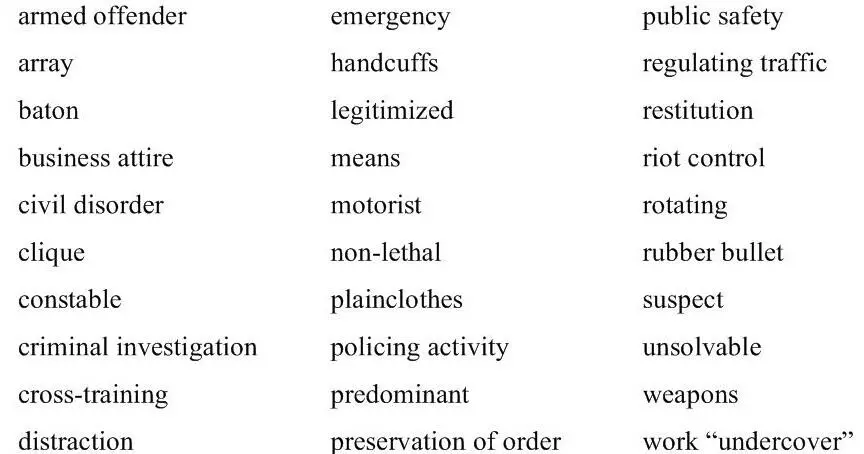
1.1.3 Прочитайте следующие утверждения и укажите, являются ли они верными:
1) Police forces are usually organized and funded by some level of government.
2) The term “constable” was still used by officers of the new police forces, and most outside London were headed by a chief constable.
3) Law enforcement constitutes major part of policing activity.
4) The City of London Police is the territorial police force responsible for law enforcement in London.
5) Police officers often carry handcuffs to restrain suspects.
6) In many jurisdictions police officers carry weapons in the normal course of their duties.
7) Police functions include protecting life and property.
8) “Plainclothes” officers often dress in business attire.
9) Police may also take on administrative duties, such as issuing firearms licenses.
10) Police detectives are responsible for investigations and detective work.
1.1.4 Переведите текст со словарем.
1.1.5 Составьте 10 вопросов к тексту.
1.1.6 Выберите ключевые предложения, перескажите текст, используя выражения: «The subject of the text is…», «The text deals…», «The main idea of the text is…», «The author comments on …».
1.2 Модуль 2. Текст Courts of England and Wales
1.2.1 Прочитайте и переведите текст. Запомните следующие выражения:
1) assizes − ассизы, выездные сессии суда присяжных (созывались в каждом графстве не меньше 3 раз в год);
2) binding − обязывающий, обязательный, имеющий обязательную силу, связующий;
3) ecclesiastical body − церковная организация;
4) Employment Tribunal − промышленный трибунал, суд по трудовым делам;
5) Family Proceedings Court − суд по семейным делам;
6) lay magistrate (justice of the peace) − мировой судья (рассматривает мелкие гражданские и уголовные дела; не имеет юридического образования и не получает денежного вознаграждения);
7) magistrates’ court – суд магистратов (рассматривает дела о мелких уголовных и гражданских преступлениях);
Читать дальшеИнтервал:
Закладка:
